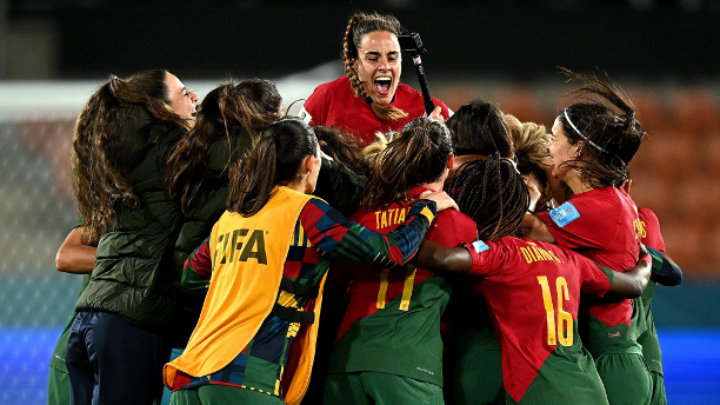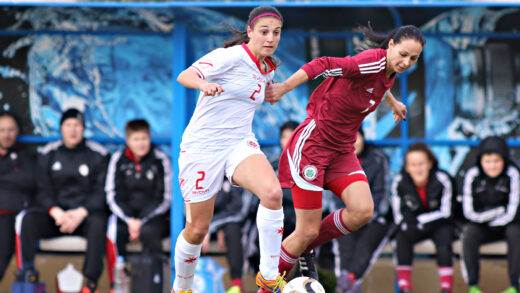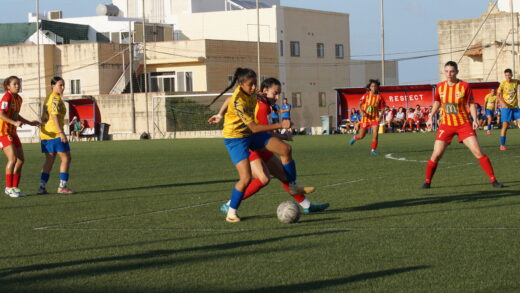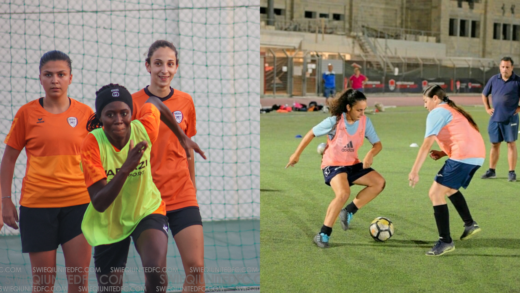Although a powerhouse in men’s football and having had a women’s national team setup since the 1980s, Portugal’s women’s team lagged behind European powerhouses until recently. Despite relegation to League B, the past ten years under Francesco Neto’s leadership show steady growth, underpinned by a real understanding of the link between improving the domestic league and its ripple effect on the national team.
A Decade Of Real Growth
While Portugal is a country that has long had football intertwined within its culture, it is also a country whose women’s national football team, and rather women’s football in general, lacked behind until recently.
Although the national women’s football team has existed since the 1980s, qualification to major European and World competitions only came to fruition in the last decade. The national team made its first appearance in a major competition in the UEFA Women’s EURO in 2017, where they upset Scotland.
The side secured an unorthodox place in the EURO competition held in England in 2022. Although they lost the play-off to Russia, Portugal qualified as a result of Russia’s expulsion due to the Ukraine invasion. They earned the opportunity for a play-off after coming in second in the group only to Finland. In the EURO finals, Portugal earned a point against Switzerland, but could not thwart the giants of Sweden and the Netherlands.
However, the country continued building to secure their first qualification to last year’s FIFA Women’s World Cup after winning a play-off against Cameroon. The group draw was not kind, pitting them against the Netherlands, the USA and Vietnam. Still, they managed a win over Vietnam, held the USA to a draw, but points against the Netherlands eluded them still.
In this time they reached their highest FIFA Women’s World Ranking of 19, with their lowest ever ranking having been that of 47 in 2007. The inaugural UEFA Women’s Nations League matches pitted them against France, Norway and Austria. The side opened with a 3-2 victory over Norway, but fell to defeats in all other matches, ultimately relegated to League B and dropping to 21 in the world in the process.
Still, the broader picture displays a country who made real strides in the past few years, pushing an existing setup to a new level and introducing world stars along the way.
Marrying Stability & Intentional Development
The national team setup has been led by Francisco Neto since 2014, which shows patience by the Portuguese Football Federation toward earning places in major competitions and trusting in his leadership once that started to trickle into consistent placings. Consistency has increased in selections too over time, underpinned by a stream of youngsters who earned a place in the senior team to support the more experienced compatriots.
As with any national team setup, the underlying base is dependent on the clubs where its players spend most of their time developing their football. Sixteen of the twenty-five players selected by Francisco Neto play with Portuguese sides Benfica, Sporting CP and Braga.
Having been around for longer, Sporting CP and Braga brought forward the experienced captain Ana Borges, goalkeeper Patricia Morais and Ines Pereira, as well as Diana Silva, Joana Martins, Carolina Mendes, Ana Capeta, Tatiana Pinto and Andrea Jacinto.
On the other hand, Benfica’s competitive life started just six years ago, in 2018. As highlighted by women’s football writer, Rich Laverty, in a recent deep-dive into the Portuguese side, Benfica was a club that had been developing youth players since 2007, crucially at a time when the Portuguese national team was at its lowest rankings. Benfica started grassroots development with the aim of ultimately having nurtured a squad fit for the second division of the Portuguese league in 2018. Although the team lost a few youth players until they went into competitive senior football, to rivals Sporting CP and Braga along the way, Portuguese football and the national team is better for their work.
Their model has been proven multiple times in their success on the pitch, perhaps perfectly summed up by eleven domestic titles and their recent UEFA Women’s Champions League campaign. After six years of playing competitive football, they held defending champions Barcelona to a 4-4 draw, and were only eliminated in the quarter-finals by giants Olympique Lyonnais. Crucially, the club’s growth ensued with a delicate balance between well-scouted foreign nationals and development of young Portuguese players.
Among those who worked their way up with Benfica are Lucia Alves, Andreia Faria and Francisca Nazareth. Ana Seica and Catarina Amado were also youngsters who were captured in their late teenage years and find themselves increasingly important members of the national team selections.
They are accompanied by Jessica Silva, who has been hailed in Portugal as the women’s team’s Cristiano Ronaldo. The prolific forward marries pace and technical ability to delight any football fan. She is also a player who brings championship winning experience having had spells abroad including with Olympique Lyonnais.
However, beyond the Portuguese domestic powerhouses, there are also few youngsters also making waves abroad. Among those looking to push for a place among the senior ranks are Arkansas Razor BackSoccer’s goalkeeper Sierra Cota-Yarde, as well as Nantes’ defender Nelly Rodrigues.
Although 27 years old, Nadia Gomes is another interesting player who revitalised her football career after a five-year hiatus following a spell at Orlando Pride. Despite taking a step back from football between 2018 and 2023, she had a stellar campaign with San Francisco in 2023, earning her a ticket to the Chicago Red Stars in the NWSL this season.
Putting everything together shows a real interest in developing women’s football in every element of the pyramid from the Portuguese Football Federation. Their political push to get Benfica into competitive football underlined just that, and it seems to be another strategy that worked well.
However, plenty more effort is still to be done to get other Portuguese football giants to introduce women’s teams in a sustainable fashion that contributes to the long-term growth of women’s football in Portugal. Crucially, it is also a country where there is still an ongoing battle for society to grant women’s football the same level of exposure and respect dedicated to its men’s teams.
Restoring A Place At The Top
As noted above, it has not been all roses. Despite a strong few years, the national team finds itself relegated to League B, with the aim of restoring their place in League A. That is perhaps a perfect example of the increasingly changing landscape in women’s football, where leaps are being made by several nations, making it a period of knife-edge decisions between cliff-like growth and disappointment.
However, Francisco Neto’s side have started their journey in the UEFA Women’s European Qualifications in the best possible way, a 3-0 shutout against Bosnia & Herzegovina.
They next meet Malta for the first time tomorrow at the Centenary Stadium at 18:30. A ranking of 21 in the world makes them heavy favourites for the match against Malta who sit at 87th in the world. However, they meet a Maltese side who continued to show strides following promotion, by holding the Northern Ireland to a draw on away territory.
As the two nations meet perhaps it is worth sparing a thought into the quality of investment put in at every level of the game in getting them to where they are over the past ten years. More importantly, it is worth envisioning where their current setups could take them in the next ten.
Lead Image: FIFA
Stay up to date by following The Sporting Fan on social media: Instagram ~ Facebook ~ X




1 Response
[…] is a country that has steadily improved the women’s game over the past years to get to the point of consecutive qualification to the EURO and also had […]